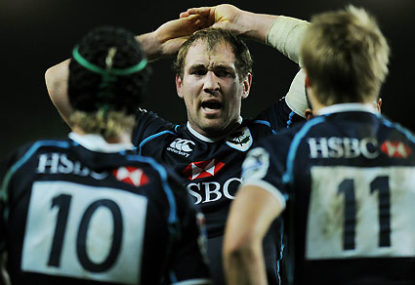Now that I’m predominantly based in South Africa, I’ve gained a unique perspective on the ongoing growth of rugby in the country. And it’s something the ARU should take note of.
Admittedly, rugby in South Africa isn’t competing with other similar codes (except for football), but the emphasis that rugby administrators and schools here place on encouraging children from a young age to really love the game is to be admired.
They use former rugby stars to help promote and teach the game to the kids, and as a result, many South Africans grow up genuinely feeling that rugby is their game. It’s not something that’s going to be taken away from them.
I’ve been to some very remote places in South Africa where rugby is absolutely alive and kicking. It’s great to see.
It will be interesting, too, to see whether the national team can live up to expectation this season.
The Springboks have a new coach, former Northern Bulls mentor Heyneke Meyer. He’ll pick a team that’s he feels is going to win.
He’s not worried about entertainment. There’s just too much pressure on coaches in South Africa to succeed. A few losses and they’re baying for your head.
They’ll also have a number of new faces running around following the retirement of several key members of the side from the past few years.
It’s a new era for the Springboks, and with the sheer number of talented players they have available for selection, they’ll be very competitive again.
It’s remarkable to think that, outside of the players that are turning out in the Super competition, there’s another 300 to 400 South Africans plying their trade in Europe.
That’s some depth, and it’s a luxury that Robbie Deans does not have with the Wallabies, who are scrambling to find quality players just for the starting side, evidenced by the awful performance of the Waratahs on the weekend and in the bland match between the Force and the Rebels.
As mentioned in a previous column, I found it very alarming to see Napolioni Nalaga, who plays for the Force, score his first try by diving over the line from a ruck.
Believe it or not, he was the number one try scorer in the French Super 14 Competition in 2011. Makes you wonder where we are headed.
For the Waratahs, it’s the same thing, week in, week out.
They talk the talk, but they just haven’t got the players or the game plan to upset any opposition. They came to South Africa needing to score tries, and all they did was aimlessly kick the ball away and were very ill-disciplined in the process.
I don’t understand why we have players who don’t pass. Or can’t pass, perhaps is the case.
Some people have said that I wouldn’t make it in the modern era and they may be right. But only because I would’ve never gotten the ball!
After losing against the Stormers, I was surprised to hear one of the Waratah coaches justifying their loss by stating that they hoped to emulate the Crusaders game plan.
The Crusaders are inherently a team full of flair and instinct. The Waratahs are not.
Flair is the thing that is going to create opportunities for the Waratahs. But they simply don’t have the creators in the team to pull it off. They have the finishers, but there’s no point having good finishers if they don’t get the ball.
In my opinion, this would be helped by moving Foley to No 10, who would put pressure on the opposition defence and create more strike power and opportunities for the back line.
In contrast, I watched the Leinster versus Ulster game over the weekend and that was a very entertaining match of rugby. The Leinster side had all the skills and the time to execute them.
It was wonderful to watch.
They back themselves on the field. And they played with real confidence and as a team.
Leinster have concentrated on the basic skills for years – catch, pass, support and run straight. The rest of the game is easy, which Leinster demonstrated.
Interestingly in 2009, this team was coached by home-grown Randwick players Michael Cheika and David Knox.
Where are these coaches now and why are Australian coaches who have proven themselves internationally not welcomed back home?





























































































